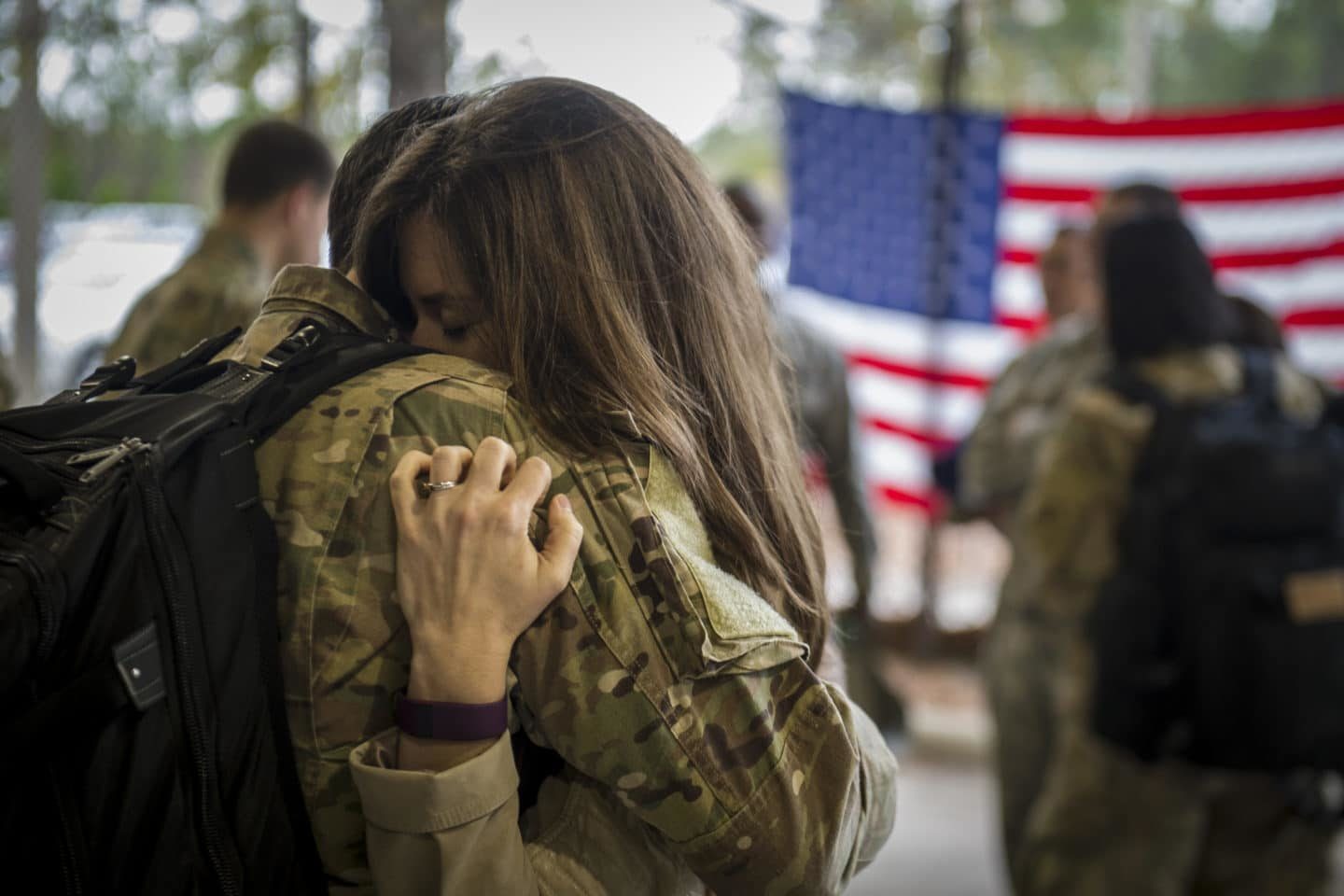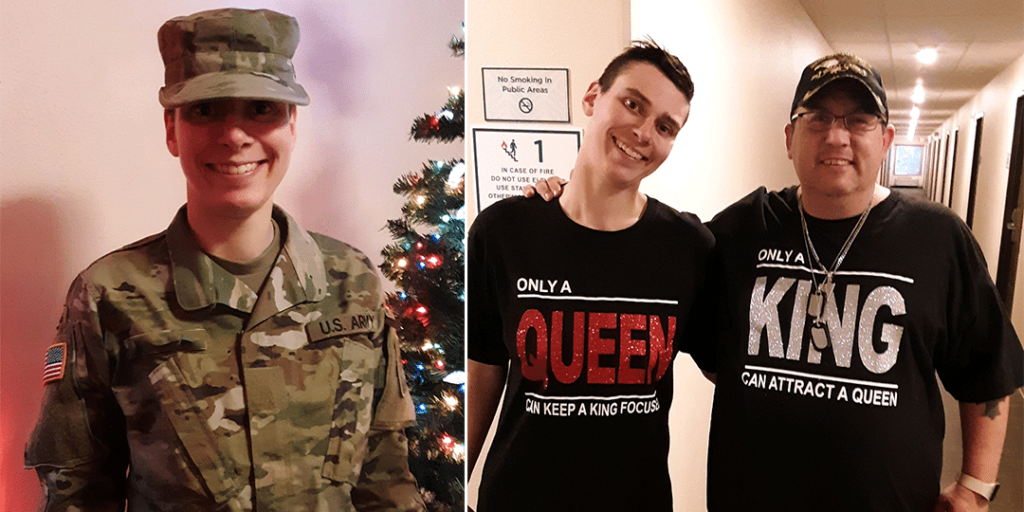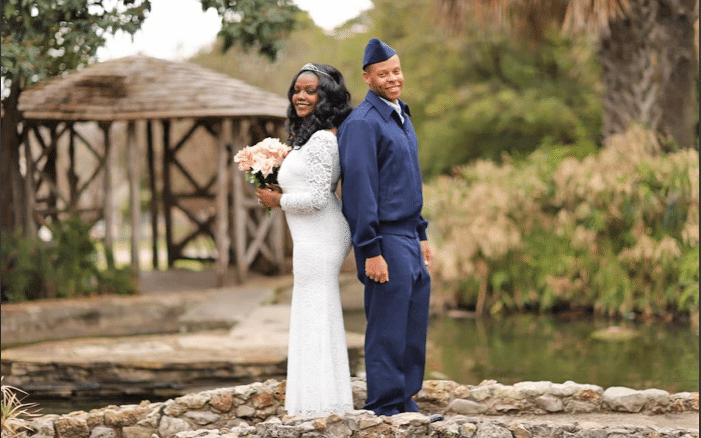Military relationships aren’t quite like other relationships. There’s something so dreamy about a service member in uniform, right?
The way they carry themselves.
How they command respect upon entering a room.
The extra perks they get when wearing a uniform.
But, really…what’s a real-life military relationship like?
Well, first off, it is hard.
If you haven’t got patience, loyalty and trust, it can be really challenging.
Why?
There’s lot of waiting. For everything.
Orders.
Phone calls.
Official dates.
Homecomings.
The list goes on.
It’s easy to romanticize about being in a relationship with a military member. But there’s a lot more than meets the eye when it comes to having a successful military relationship.
That’s why we’re compiling a handy list of 5 things to keep in mind if that man (or woman!) in uniform is too hard to resist.
1. Long distance is inevitable
What happens when the military whisks them away from your arms?
A lot of alone time, unfortunately.
Maybe that means boot camp. Or worse yet, a deployment.
Warning: You will hear this a lot — “You knew what you signed up for when you started dating, got married, etc., that you would be separated a lot.”
It’s annoying. It’s also true.
But it doesn’t make it any easier.
Stay busy. Talk with your loved one when you can. Remind them of your love and support when they are having a tough time.
On the hard days, remember this isn’t forever.
Stateside duty stations are just on the horizon.
2. Communication is key
As with any relationship, communication is a critical cornerstone. It’s especially important to have excellent communication tools in military relationships where conversation can sometimes be scarce.
Learn one another’s communication style long before you’re separated to avoid going round and round with bad communication.
Here’s some things to keep in mind before and during separation phases:
- Talk when rested. Save serious conversations for when you’re both well-rested and have time to talk. Finances, holiday planning, etc. fall into this category. Rushing these talks will lead to frustration. Unfortunately, when they are deployed, sometimes sending an email or letter is the only option.
- Actively listen, then respond. Even if you really want to respond, cutting them off mid-sentence can quickly derail the chat. Try to really hear what your other half is saying, paraphrase and then continue with your thoughts.
- Set realistic expectations. It’s unlikely you will hear from your service member daily when they are on assignment. Sometimes communication can be down (for days) and/or letters get lost in the mail.
- Use a fun app. Consider the Love Every Day app to keep things lively. Get 21 questions each day to respond to together via text message. You’ll learn something new and it gets conversations flowing.
You might not hear from your service member for days, and sometimes weeks. Keep in mind they are working a very important job — homeland security, essentially — and that sometimes communicating with family isn’t feasible.
3. Be OK with being alone
The military likes to keep its people busy.
Very busy.
There’s planes to fly. Guns to shoot. Ships to sail.
You get the idea.
That makes for very long work days (even on shore/stateside commands) for your service member. If it’s been a 16-plus hour day, they may even decide to stay on base for the night in some cases.
That nice dinner you planned with the candles and wine will have to wait.
Or you can enjoy it alone.
There will be many times where grand plans you’ve made are swiftly and immediately changed by the federal government.
Sometimes that means sending your sweetie to train in California for two months. Other times that means a year-long deployment.
Alone time is plentiful when you’re a part of a military couple. Learning to be independent can be one of the most helpful tools in surviving the darkest parts of a military relationship.
Take the time to learn a new hobby. Join a club. Meet fellow military girlfriends/boyfriends/spouses, etc.
Stay busy, busy, busy.
4. Flexibility is a must
Just know — in the military’s eyes — the uniform comes first. It doesn’t care about plans you made a year ago. Or the fact that you might be about to give birth when orders come.
Basically, Uncle Sam runs your planning schedule if you’re one part of a military couple.
It’s not easy. It’s not fun.
But it’s military life.
And if it can teach you one incredible skill, it’s that flexibility will make things seem so much smoother.
If you’re stubborn and cry over every single time plans get changed thanks to a new mission plan, you’re going to be chronically exhausted.
Instead of getting bent out of shape when you hear leave time is cancelled, take the time to do something for yourself.
Remember tip #3?
You’ll find your stress is lowered and that going with the flow makes you less resentful and angry.
And when you see your loved one, it will be that much sweeter.
Which leads us to…
5. Homecoming is amazing
You’ve seen the videos.
The kisses. The hugs. The hug-twirl combos.
Babies meeting their daddies for the first time.
You’re getting teary-eyed just thinking about it, right?
Any service member will tell you that homecoming day is the happiest day of their service lives.
But getting to that point is exhausting, long, and, often, very stressful.
Couples who have done any number of deployments will tell you it’s the most bittersweet and emotionally exhausting moment.
After any length of being apart, it feels like walking on cloud nine when you’re reunited.
It’s literally the best day of your couple life.
Tough, but worth it
Every couple is different, but there are some essentials to making a relationship challenged by the military succeed. Clear communication, constant support and fierce loyalty are just a few of many factors to thriving as a military couple. Treat every day you have your loved one home like it’s leave time.
It’ll make you appreciate them more than you ever thought you could.
Are you in a military relationship with someone who is going to basic training learn about writing letters to basic training on our blog.





